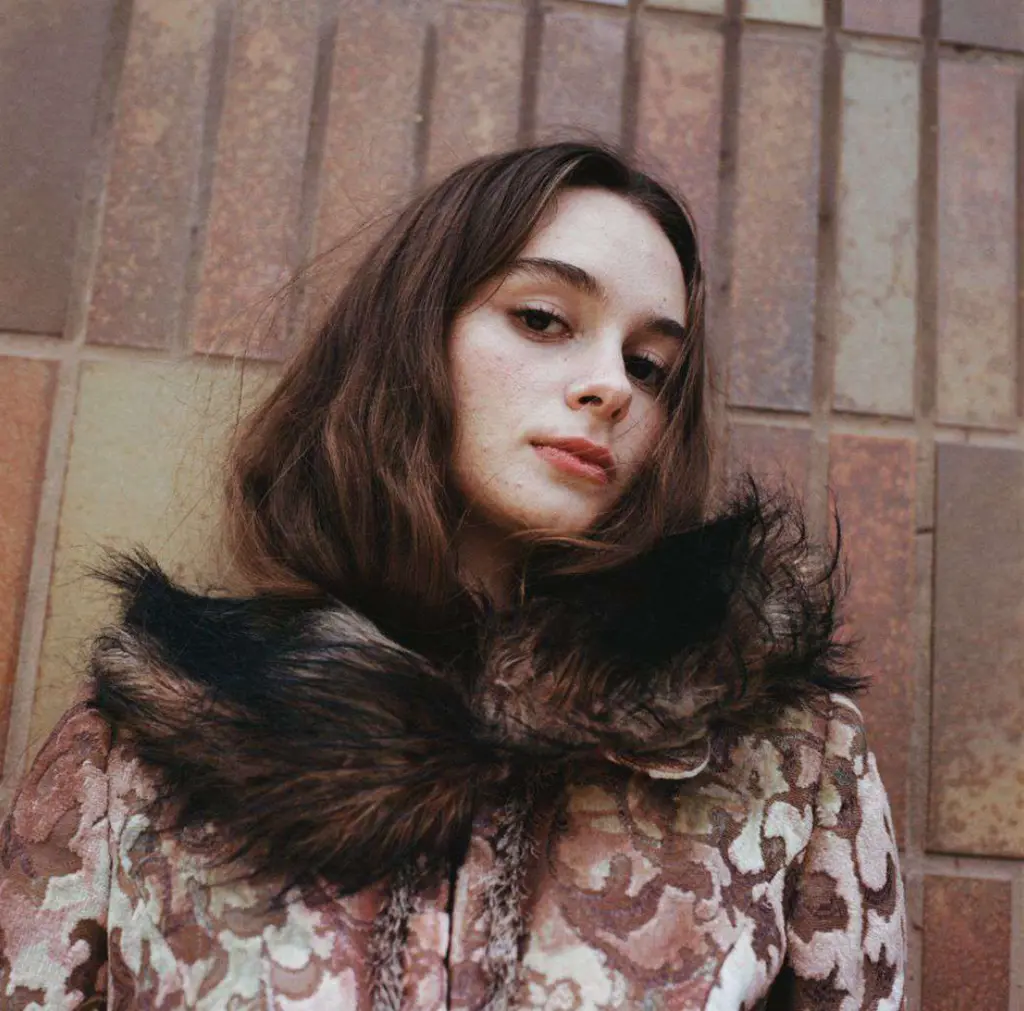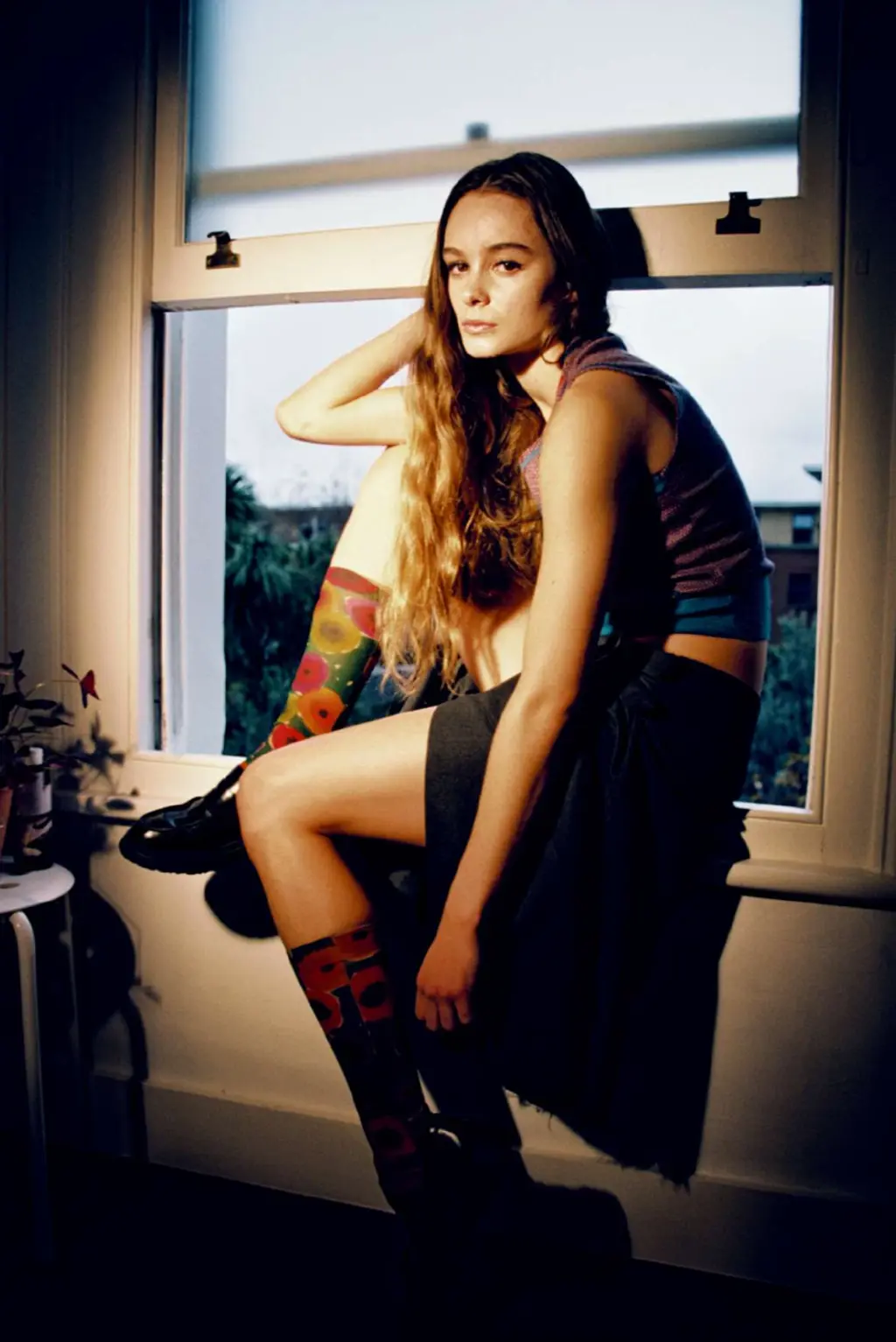Saura Lightfoot-Leon on leading Luna Carmoon’s wild debut film, Hoard

Ahead of its release on Friday, we caught up with the Dutch newcomer to talk about her first major role in a film that throws all conventions out of the window… and then some. Sex, grief, food fights – Hoard has got it all.
Culture
Words: Jade Wickes
Photography: Milly Cope
When Saura Lightfoot-Leon, 26, the star of Hoard – one of this year’s most unusual, visceral watches – met the film’s director Luna Carmoon, they had an instant connection.
“It was momentous,” Saura says, Zooming in from her home in London, her current base. “Her furry hat, the way she was sitting on the sofa, giggling… It was very special. When I look back at that time now, it was just joyous, like child’s play or stepping into Alice in Wonderland.”
Partly based on the life of Carmoon’s nan, Hoard is split into two parts: the first, which takes place in 1984, introduces us to a young Maria (Lily-Beau Leach) and her mum Cynthia (I, Daniel Blake’s Hayley Squires), a compulsive hoarder who fills their home with mountains of rubbish and found trinkets. It’s a strange, at times disturbing existence, but despite what Cynthia has accumulated – and the near-unlivable home environment she’s created – she and Maria share a bond that transcends the average parent-child dynamic.
Fast forward to ’90s-era South London. Maria is in her late teens and played with enticing impenetrability by Saura in her first proper acting gig. Now thriving thanks to a caring foster mum (Samantha Spiro from Sex Education), her life is once again upended when her biological mother’s ashes are delivered to her door. This, handily, coincides with the return of Michael (Stranger Things’ Joseph Quinn), who was once a foster kid there himself.
Chaos, to say the least, ensues, as the pair become enthralled and galvanised by each other’s base desires. Maria is motivated by grief and a search for self-knowledge; Michael by an obsession with Maria and a desperation to get away from the monotony of his own life. Shaped by objectively traumatic experiences, Maria nonetheless treasures them as formative – and we, as the audience, get to tumble down a rabbit hole of filthy grotesquery that might even make John Waters blush.
“I was laughing the other day with my friends because I remember auditioning for Hoard so vividly,” Saura continues. “When I read the script, I was like, I have no idea what’s happening. I had no context for the story – just a moodboard that Luna created. I love working that way, via photographs, music and feeling-based stuff. It was wonderful and I felt like I was about to jump into something big. I loved it immediately.”
Originally from The Hague, in northern Holland, Saura grew up watching her choreographer parents rehearse; she’d sit in studio corners and study them intently, keen to one day put on a performance of her own. “I was always really encouraged to make art,” she says. “I found school hard and boring, but when an English teacher suggested I start acting, I felt scared but also drawn towards the challenge.”
After graduating from London’s Rada (Royal Academy of Dramatic Art) in 2020, Saura landed small roles in BBC TV drama Life After Life and Apple TV+’s Masters of the Air before the script for Hoard landed at her feet. “Going from being a small cog in a big wheel and learning so much, to this world I had no idea about… all the barriers were broken down in Hoard. It was really special, and it was hard to say goodbye.”
Luckily for us, that isn’t the case: we get to see it on the big screen later this week. And when Saura gets a little Hoard-sick, she just watches it again – so far, it’s been four times. “Each watch was an event. The more I watch, the more I see. It’s jam-packed.”
“Michael and Maria are on different journeys: he gets intertwined with her, and she gets intertwined with the past”
Hi, Saura! Hoard tells such an unusual story, which must’ve been hard to conjure up in your mind just from reading the script. What initially appealed to you about the project?
Maria stood out to me as a character because of her wildness. There’s a feral quality about her which Luna talked to me about in the early stages. It’s slightly abstract, but there were textures and things that I felt from the pictures and images that she referenced – they struck a chord with me. I was hooked. You don’t often get female roles which give you a licence to go anywhere. That’s what’s brilliant about Luna’s writing. She gave you the key, but you had to figure out how to unlock the scenes. I didn’t know the full story until very late on, which was purposeful. I was being drip-fed and lots of stuff was totally improvised. Hoard was like a messy gift. It was Luna’s passion, to be honest, and the grief element, too, that appealed to me the most about it. I’d just lost my grandmother, so I met Luna, we started talking about grief, and became very enmeshed. There was a wordless understanding between us.
So much of the film feels like what might happen if you let your intrusive thoughts take over. That must’ve been really fun and cathartic to act out…
Absolutely. Politeness went out the window, especially as Maria started to spiral and as memories and grief took over her. That’s why she becomes irritable, rude and raw. It starts to affect her relationships with every single character in the film. There’s Janice, the next-door neighbour, the nosy parker. She’s a good litmus test for Maria’s mood, which you can read depending on how she acts around Janice. It’s a real mirror. What a gift, for an actor to just be able to let loose! I got to go to many places that I dreamed of. The animal instinct we all have, I tapped into that.
Maria goes down this hole as a way of processing her mother’s death, but then she meets Michael, who’s a kindred spirit. Why do you think they connected so deeply?
They can smell the trauma on each other – it’s like this familiar pheromone. It’s a way out, an escape. The film reveals what happens when you let yourself go as far as possible. You get to see both perspectives, but Michael and Maria are on different journeys: he gets intertwined with her and she gets intertwined with the past.


How did you go about building up a relationship with the other actors?
It was kind of like making friends in day-to-day life. Hoard was a six-week, intensive shoot with a couple of rehearsals. But it all worked thanks to the atmosphere that Luna created. She made us all feel like we were part of her thing and like all of us had something to give. I felt honoured, to be honest. We connected over our passion for this thing. The shoot started on my birthday – the make-up ladies got me chocolate chip cookies, with the whole crew eating and chatting. There was an immediate element of familiarity.
If Maria was a music genre, which one would she be?
’80s pop. A twinkle in your eye, rainbows, sunshine, warm, happy feelings.
What did you learn about yourself in the process of shooting Hoard?
That I go pretty deep! It was quite a consuming process because I really cared about it. I tend to throw myself all in. It was my first film baby. Also just not getting tired if you start at 8am and you’re going all day – what to eat, practical things like when to rest. Which sounds boring but is really important.
What do you hope people will take away from watching it?
Some sort of solace. I hope they can laugh and empathise, and I hope they can see themselves in it, even if it’s just a small part. Hoard is a mirror to humanity and the human psyche, and it’s a story about grief. I hope people who’ve experienced that can walk out and feel a little kinder to themselves.



